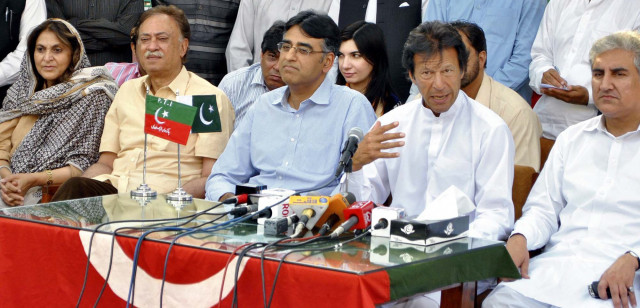Tight fiscal measures may stall nascent economic recovery
Contours of mini-budget reveal government intends to suppress aggregate demand

PTI leader Asad Umar. PHOTO: EXPRESS
This suppression of aggregate demand is a short-term measure which may affect long-term economic growth. Unfortunately, successive governments have followed this approach keeping in view their political cycles.
These governments have adopted short-term measures to boost the economy without taking into account long-run implications. Whenever a political government assumes office, it has to negotiate a financial constraint.
This financial constraint is translated into politically charged slogan “Khazana khali hai” due to excessive spending by the previous government and now our government will make utmost efforts to cleanse the rot and allocate resources efficiently.
A political government has to surmount a number of challenges out of which external financial constraint is the most important. After taking reins of power, the governments show apparent calmness that the situation is under control and they will manage it easily.
This temporary state ends after borrowing from the IMF as this institution is designed to provide balance of payments support for the countries in dire need.
Going to the IMF requires certain pre-conditions which a government has to meet. In order to meet those conditions, the current government introduced the mini-budget.
The government started with revising gas prices upwards though it claims that the poor would least likely be affected from it. This claim requires qualification that the poor won’t be affected directly, but indirectly.
Any upward revision in utilities’ tariffs has a direct bearing on the poor segment of society. For the time being, the government has delayed the upward revision in electricity prices.
There is positive news for the fertiliser manufacturers who will receive support from the government to run their idle capacities which will help in bridging the emerging shortfall in urea production.
In addition to this, there is a continuation of subsidies for Pakistan’s exports. These subsidies should be calibrated in order to promote a healthy economy.
A lack of fiscal flexibility is another hallmark of our macroeconomic budgetary framework. Whenever a political government wants to reduce the budget deficit, the current expenditure could not be reduced and the axe normally falls on the development budget.
Therefore, the government has scaled down the Public Sector Development Programme (PSDP) allocation to achieve its target.
The government intends to curb the budget deficit to 5.1% of GDP through a proposed fiscal adjustment of Rs814 billion. These measures are being taken at a time when the economy has started to show signs of recovery. These measures may stall the nascent recovery.
On the one hand, the government wants to broaden the tax base, but on the other hand, it has allowed non-filers of tax returns to buy real estate and cars. Barring non-filers from buying these assets is necessary to widen the tax base. Any policy reversal could be inimical to the growth of formal economy.
Successive governments don’t follow the same set of objectives to steer the economy. If they pursue the same set of objectives, the result would be different.
Now onwards, there should be consistency in the policy with reference to non-filers regardless of the political government. This consistency will nurture the desired formal economy.
Succumbing to one lobby will provide opportunities for other lobbies to hard peddle their interests.
In a nutshell, the mini budget reflects that the government intends to follow tight fiscal and monetary policies. This tightening will ultimately slow down economic growth to around 5%. These steps show that there is no break from the past and this time is not even different.
The writer is Assistant Professor of Economics at SDSB, Lahore University of Management Sciences
Published in The Express Tribune, October 1st, 2018.
Like Business on Facebook, follow @TribuneBiz on Twitter to stay informed and join in the conversation.



















COMMENTS
Comments are moderated and generally will be posted if they are on-topic and not abusive.
For more information, please see our Comments FAQ